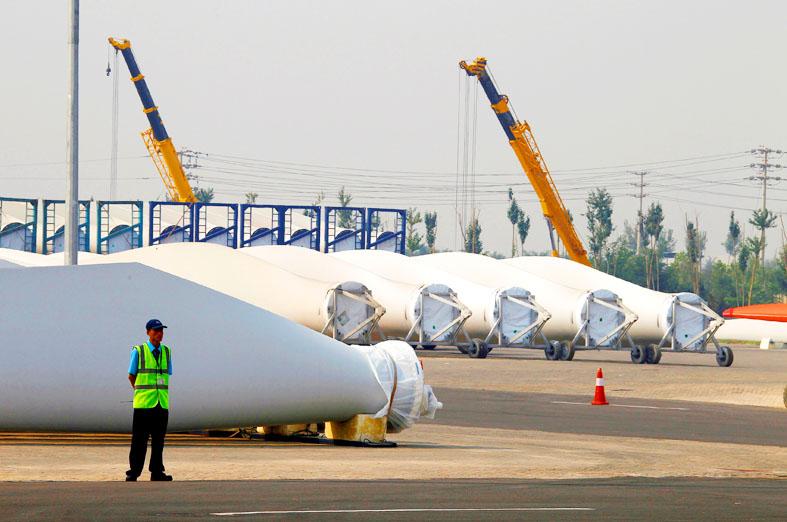Danish wind turbine maker Vestas A/S yesterday said it has invested NT$1 billion (US$36.07 million) in its local supply chain to supply components for its 9.5 megawatt (MW) V174 turbine.
The project has helped created 1,500 jobs, including 150 jobs by Vestas itself, Vestas country manager Alex Robertson said.
The turbine is to be used in four offshore wind farm projects for a total of 123 wind turbine generators, or 1.2 gigawatts (GW) of total capacity, he said.

Photo: Reuters
“This is localization like I’ve never seen before,” Robertson told a media briefing in Taipei.
Vestas highlighted 10 Taiwanese supply chain partners that are either in production or awaiting certification as Vestas-approved component manufacturers, including Yeoungguan Group (永冠集團) for nacelle and hub castings, Fortune Electric Co (華城電機) for nacelle and hub assembly, Tienli Group (天力集團) for wind turbine blade manufacturing and Shihlin Electric & Engineering Corp (士林電機) for transformers and switchgears.
However, there is no guarantee that the supply chain that has been built for the V174 would make the transition to being a supplier of Vestas’ next model, the behemoth 15MW V236, which is taller than the 245m Shin Kong Life Tower (新光摩天大樓) in Taipei.
Wind turbines have been rapidly growing in size to improve energy yield efficiency.
The V236 will produce 65 percent more energy than its predecessor, Vestas said.
“Our 30-year supply chains in Europe will find making this turbine difficult,” Robertson said. “Our supply chain in Taiwan is only three years old. However, we have invested a lot into our existing suppliers and will do our best to explore feasibility.”
Robertson urged the Taiwanese government to go light on strict localization requirements and to focus support on Taiwanese companies that have what it takes to export internationally.
“In 10 years’ time, all that is going to matter is how many truly internationally competitive suppliers we have,” Robertson said. “It is better to have three true champions than 15 companies that can only survive in the Taiwan market.”
The Industrial Development Bureau is on Monday set to release localization requirements for the third round of Taiwanese offshore wind development.
Lin Hua-yu (林華宇), director of the bureau’s Metal and Mechanical Industries Division, said that while localization requirements mandate sourcing at least 60 percent of certain wind turbine components in Taiwan, the requirement is contingent on there being a Taiwanese company willing to produce the component.
“If there is a Taiwanese company willing to make the component, we guarantee them a percentage to help them start up their business as their costs will inevitably be higher in the beginning,” Lin said.
“However, businesses will only be willing to take on a new product if they think they have a chance to make it in the export market eventually,” Lin added.
This story has been modified since it was first published, which incorrectly stated that Vestas invests NT$9 billion in local supply chain in the headline and in the first paragraph.

CAUTIOUS RECOVERY: While the manufacturing sector returned to growth amid the US-China trade truce, firms remain wary as uncertainty clouds the outlook, the CIER said The local manufacturing sector returned to expansion last month, as the official purchasing managers’ index (PMI) rose 2.1 points to 51.0, driven by a temporary easing in US-China trade tensions, the Chung-Hua Institution for Economic Research (CIER, 中華經濟研究院) said yesterday. The PMI gauges the health of the manufacturing industry, with readings above 50 indicating expansion and those below 50 signaling contraction. “Firms are not as pessimistic as they were in April, but they remain far from optimistic,” CIER president Lien Hsien-ming (連賢明) said at a news conference. The full impact of US tariff decisions is unlikely to become clear until later this month

With an approval rating of just two percent, Peruvian President Dina Boluarte might be the world’s most unpopular leader, according to pollsters. Protests greeted her rise to power 29 months ago, and have marked her entire term — joined by assorted scandals, investigations, controversies and a surge in gang violence. The 63-year-old is the target of a dozen probes, including for her alleged failure to declare gifts of luxury jewels and watches, a scandal inevitably dubbed “Rolexgate.” She is also under the microscope for a two-week undeclared absence for nose surgery — which she insists was medical, not cosmetic — and is

GROWING CONCERN: Some senior Trump administration officials opposed the UAE expansion over fears that another TSMC project could jeopardize its US investment Taiwan Semiconductor Manufacturing Co (TSMC, 台積電) is evaluating building an advanced production facility in the United Arab Emirates (UAE) and has discussed the possibility with officials in US President Donald Trump’s administration, people familiar with the matter said, in a potentially major bet on the Middle East that would only come to fruition with Washington’s approval. The company has had multiple meetings in the past few months with US Special Envoy to the Middle East Steve Witkoff and officials from MGX, an influential investment vehicle overseen by the UAE president’s brother, the people said. The conversations are a continuation of talks that

Alchip Technologies Ltd (世芯), an application-specific integrated circuit (ASIC) designer specializing in artificial-intelligence (AI) chips, yesterday said that small-volume production of 3-nanometer (nm) chips for a key customer is on track to start by the end of this year, dismissing speculation about delays in producing advanced chips. As Alchip is transitioning from 7-nanometer and 5-nanometer process technology to 3 nanometers, investors and shareholders have been closely monitoring whether the company is navigating through such transition smoothly. “We are proceeding well in [building] this generation [of chips]. It appears to me that no revision will be required. We have achieved success in designing